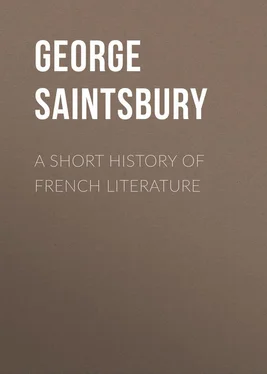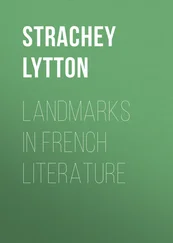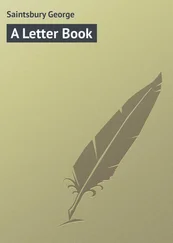George Saintsbury - A Short History of French Literature
Здесь есть возможность читать онлайн «George Saintsbury - A Short History of French Literature» — ознакомительный отрывок электронной книги совершенно бесплатно, а после прочтения отрывка купить полную версию. В некоторых случаях можно слушать аудио, скачать через торрент в формате fb2 и присутствует краткое содержание. ISBN: , Жанр: foreign_prose, на английском языке. Описание произведения, (предисловие) а так же отзывы посетителей доступны на портале библиотеки ЛибКат.
- Название:A Short History of French Literature
- Автор:
- Жанр:
- Год:неизвестен
- ISBN:http://www.gutenberg.org/ebooks/33062
- Рейтинг книги:3 / 5. Голосов: 1
-
Избранное:Добавить в избранное
- Отзывы:
-
Ваша оценка:
- 60
- 1
- 2
- 3
- 4
- 5
A Short History of French Literature: краткое содержание, описание и аннотация
Предлагаем к чтению аннотацию, описание, краткое содержание или предисловие (зависит от того, что написал сам автор книги «A Short History of French Literature»). Если вы не нашли необходимую информацию о книге — напишите в комментариях, мы постараемся отыскать её.
A Short History of French Literature — читать онлайн ознакомительный отрывок
Ниже представлен текст книги, разбитый по страницам. Система сохранения места последней прочитанной страницы, позволяет с удобством читать онлайн бесплатно книгу «A Short History of French Literature», без необходимости каждый раз заново искать на чём Вы остановились. Поставьте закладку, и сможете в любой момент перейти на страницу, на которой закончили чтение.
Интервал:
Закладка:
In the Fabliaux the state of things is quite different. The attitude is always a mocking one, not often going the length of serious satire or moral indignation, but contenting itself with the peculiar ludicrous presentation of life and humanity of which the French have ever since been the masters. In the Fabliaux begins that long course of scoffing at the weaknesses of the feminine sex which has never been interrupted since. In the Fabliaux is to be found for the first time satirical delineation of the frailties of churchmen instead of adoring celebration of the mysteries of the Church. All classes come in by turns for ridicule – knights, burghers, peasants. Unfortunately this freedom in choice of subject is accompanied by a still greater freedom in the choice of language. The coarseness of expression in many of the Fabliaux equals, if it does not exceed, that to be found in any other branch of Western literature.
Definition of Fabliaux.
The interest of the Fabliaux as a literary study is increased by the precision with which they can be defined, and the well-marked period of their composition. According to the excellent definition of its latest editor, the Fabliau 61 61 Fabliau is, of course, the Latin fabula . The genealogy of the word is fabula , fabella , fabel , fable , fablel , fableau , fabliau . All these last five forms exist.
is 'le récit, le plus souvent comique, d'une aventure réelle ou possible, qui se passe dans les données moyennes de la vie humaine,' the recital, for the most part comic, of a real or possible event occurring in the ordinary conditions of human life. M. de Montaiglon, to be rigidly accurate, should have added that it must be in verse, and, with very rare, if any, exceptions, in octosyllabic couplets. Of such Fabliaux, properly so called, we possess perhaps two hundred. They are of the most various length, sometimes not extending to more than a score or so of lines, sometimes containing several hundreds. They are, like most contemporary literature, chiefly anonymous, or attributed to persons of whom nothing is known, though some famous names, especially that of the Trouvère Rutebœuf, appear among their authors. Their period of composition seems to have extended from the latter half of the twelfth century to the latter half of the fourteenth, no manuscript that we have of them being earlier than the beginning of the thirteenth century, and none later than the beginning of the fifteenth. If, however, their popularity in their original form ceased at the latter period, their course was by no means run. They had passed early from France into Italy (as indeed all the oldest French literature did), and the stock-in-trade of all the Italian Novellieri from Boccaccio downwards was supplied by them. In England they found an illustrious copyist in Chaucer, whose Canterbury Tales are perfect Fabliaux, informed by greater art and more poetical spirit than were possessed by their original authors. In France itself the Fabliaux simply became farces or prose tales, as the wandering reciter of verse gave way to the actor and the bookseller. They appear again (sometimes after a roundabout journey through Italian versions) in the pages of the French tale-tellers of the Renaissance, and finally, as far as collected appearance is concerned, receive their last but not their least brilliant transformation in the Contes of La Fontaine. In these the cycle is curiously concluded by a return to the form of the original.
Subjects and character of Fabliaux.
Until MM. de Montaiglon and Raynaud undertook their edition, which has been slowly completed, the study of the Fabliaux was complicated by the somewhat chaotic conditions of the earlier collections. Barbazan and his followers printed as Fabliaux almost everything that they found in verse which was tolerably short. Thus, not merely the mediaeval poems called dits and débats , descriptions of objects either in monologue or dialogue, which come sometimes very close to the Fabliau proper, but moral discourses, short romances, legends like the Lai d'Aristote , and such-like things, were included. This interferes with a comprehension of the remarkably characteristic and clearly marked peculiarities of the Fabliau indicated in the definition given above. As according to this the Fabliau is a short comic verse tale of ordinary life, it will be evident that the attempts which have been made to classify Fabliaux according to their subjects were not very happy. It is of course possible to take such headings as Priests, Women, Villeins, Knights, etc., and arrange the existing Fabliaux under them. But it is not obvious what is gained thereby. A better notion of the genre may perhaps be obtained from a short view of the subjects of some of the principal of those Fabliaux whose subjects are capable of description. Les deux Bordeors Ribaux is a dispute between two Jongleurs who boast their skill. It is remarkable for a very curious list of Chansons de Gestes which the clumsy reciter quotes all wrong, and for a great number of the sly hits at chivalry and the chivalrous romances which are characteristic of all this literature. Thus one Jongleur, going through the list of his knightly patrons, tells of Monseignor Augier Poupée —
'Qui à un seul coup de s'espee
Coupe bien à un chat l'oreille;'
and of Monseignor Rogier Ertaut, whose soundness in wind and limb is not due to enchanted armour or skill in fight, but is accounted for thus —
'Quar onques ne ot cop feru' (for that never has he struck a blow).
Le Vair Palefroi contains the story of a lover who carries off his beloved on a palfrey grey from an aged wooer. La Housse Partie , a great favourite, which appears in more than one form, tells the tale of an unnatural son who turns his father out of doors, but is brought to a better mind by his own child, who innocently gives him warning that he in turn will copy his example. Sire Hain et Dame Anieuse is one of the innumerable stories of rough correction of scolding wives. Brunain la Vache au Prestre recounts a trick played on a covetous priest. In Le Dit des Perdrix , a greedy wife eats a brace of partridges which her husband has destined for his own dinner, and escapes his wrath by one of the endless stratagems which these tales delight in assigning to womankind. Le sot Chevalier , though extremely indecorous, deserves notice for the Chaucerian breadth of its farce, at which it is impossible to help laughing. The two Englishmen and the Lamb is perhaps the earliest example of English-French, and turns upon the mistake which results in an ass's foal being bought instead of the required animal. Le Mantel Mautaillié is the famous Arthurian story known in English as 'The Boy and the Mantle.' Le Vilain Mire is the original of Molière's Médecin malgré lui . Le Vilain qui conquist Paradis par Plaist is characteristic of the curious irreverence which accompanied mediaeval devotion. A villein comes to heaven's gate, is refused admission, and successively silences St. Peter, St. Thomas, and St. Paul, by very pointed references to their earthly weaknesses. As a last specimen may be mentioned the curiously simple word-play of Estula . This is the name of a little dog which, being pronounced, certain thieves take for 'Es tu là?'
Sources of Fabliaux.
Such are a very few, selected as well as may be for their typical character, of these stories. It is not unimportant to consider briefly the question of their origin. Many of them belong no doubt to that strange common fund of fiction which all nations of the earth indiscriminately possess. A considerable number seem to be of purely original and indigenous growth: but an actual literary source is not wanting in many cases. The classics supplied some part of them, the Scriptures and the lives of the saints another part; while not a little was due to the importation of Eastern collections of stories resulting from the Crusades. The chief of these collections were the fables of Bidpai or Pilpai, in the form known as the romance of 'Calila and Dimna,' and the story of Sendabar (in its Greek form Syntipas). This was immensely popular in France under the verse form of Dolopathos , and the prose form of Les sept Sages de Rome . The remarkable collection of stories called the Gesta Romanorum is apparently of later date than most of the Fabliaux; but the tales of which it was composed no doubt floated for some time in the mouths of Jongleurs before the unknown and probably English author put them together in Latin.
Читать дальшеИнтервал:
Закладка:
Похожие книги на «A Short History of French Literature»
Представляем Вашему вниманию похожие книги на «A Short History of French Literature» списком для выбора. Мы отобрали схожую по названию и смыслу литературу в надежде предоставить читателям больше вариантов отыскать новые, интересные, ещё непрочитанные произведения.
Обсуждение, отзывы о книге «A Short History of French Literature» и просто собственные мнения читателей. Оставьте ваши комментарии, напишите, что Вы думаете о произведении, его смысле или главных героях. Укажите что конкретно понравилось, а что нет, и почему Вы так считаете.












